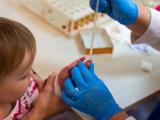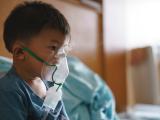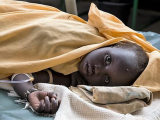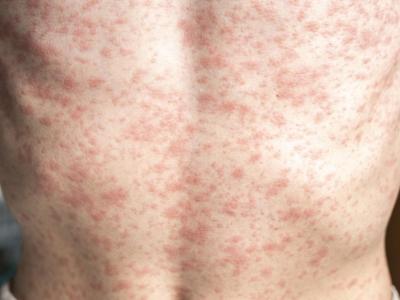Sep 7, 2005 (CIDRAP News) Tests have shown that floodwaters in hurricane-struck New Orleans are heavily contaminated with sewage and contain dangerous levels of lead as well, federal officials said today.
"The water is full of sewage," said Dr. Julie Gerberding, director of the Centers for Disease Control and Prevention (CDC), at a Washington news teleconference.
Officials also said that people displaced by the hurricane will be offered influenza vaccine donated by a manufacturer and that at least three people have died of Vibrio vulnificus infections related to the hurricane.
Stephen L. Johnson, administrator of the Environmental Protection Agency (EPA), said, "Counts for E coli and coliform bacteria in these tested areas greatly exceed EPA's recommended levels for contact. Human contact with the floodwaters should be avoided as much as possible."
The EPA is testing the water for more than 100 chemical compounds and has found that lead concentrations "exceed what EPA considers safe drinking water levels," Johnson added. "These are of greatest concern for children."
He didn't give specific results for any other chemicals, but said that every measured contaminant was more than 10 times higher than what is considered the maximum safe concentration.
Testing so far has focused on residential areas, not industrial areas, he said. The tests mark the beginning of an extensive sampling program, which will be reviewed by an independent advisory committee, he added.
Gerberding explained that the EPA uses coliform bacteria, a category that includes several species, as a marker of sewage contamination. "We've not gone in and looked for every kind of bacteria that might be in the water," she said.
Gerberding also said today that the CDC would be encouraging flu shots for hurricane evacuees as part of efforts to protect them from diseases. "We're recommending that all evacuees be treated with influenza vaccine when it becomes available," she said. "Already, Sanofi [Sanofi Aventis] is making 200,000 of the first doses available to these evacuees so we can protect them while they're in the shelters." Sanofi is the leading supplier of flu vaccine in the United States.
Concern about infectious disease outbreaks has been high since Hurricane Katrina ravaged the Gulf Coast on Aug 29, leaving 80% of New Orleans under water. So far, however, relatively few cases have been reported.
The CDC was investigating four cases of V vulnificus infection, three of which were fatal, Gerberding said. The infection can result from eating contaminated seafood or from having a wound exposed to saltwater, and it can be severe in people with weak immunity, according to the CDC. Although V vulnificus is related to the bacteria that cause cholera, the illness "in no way resembles cholera," Gerberding said.
An Associated Press (AP) report today said four deaths, all in elderly or immunocompromised people, might have been caused by V vulnificus infections in Katrina's wake. The cases were blamed on infected wounds, CDC spokesman Tom Skinner told the AP. Three deaths were in Mississippi and one was in an evacuee in Texas.
A report posted yesterday on ProMED-mail said a 60-year-old man who had been evacuated from New Orleans died of V vulnificus infection at a Dallas hospital. Despite antibiotic treatment, the man died within 36 hours after he was admitted on Sep 2, said the report by Steven M. Seidenfeld, MD.
Gerberding said sporadic outbreaks of gastrointestinal illness, including some norovirus cases, have occurred in the shelters for hurricane evacuees. Infection control practitioners are working in the shelters and have brought long rows of sinks into Houston's Astrodome for handwashing, she added.
She stressed the importance of keeping skin wounds covered and washing hands before eating. Most of the infectious illnesses likely to crop up among hurricane evacuees are not life-threatening, she added. "It's just that right now everyone is in a very fragile state and we want to do everything possible to protect their health."



















